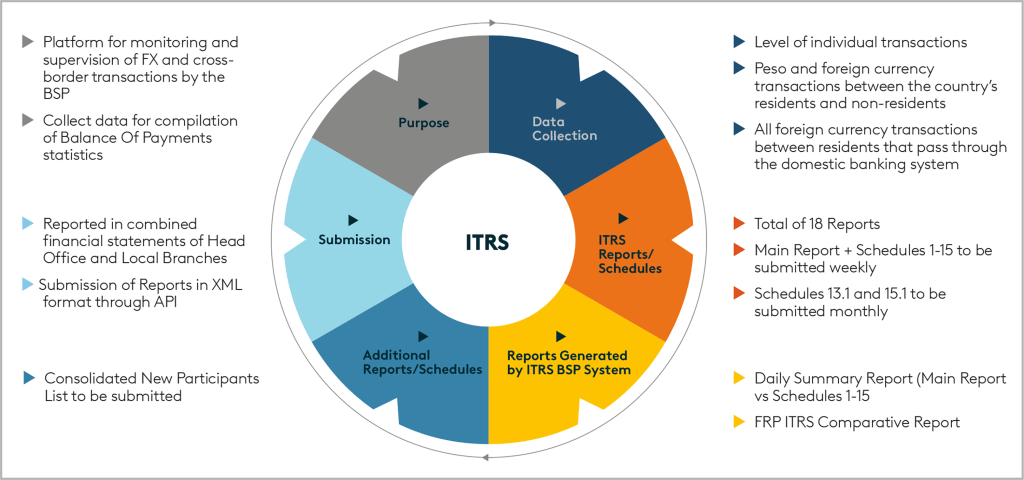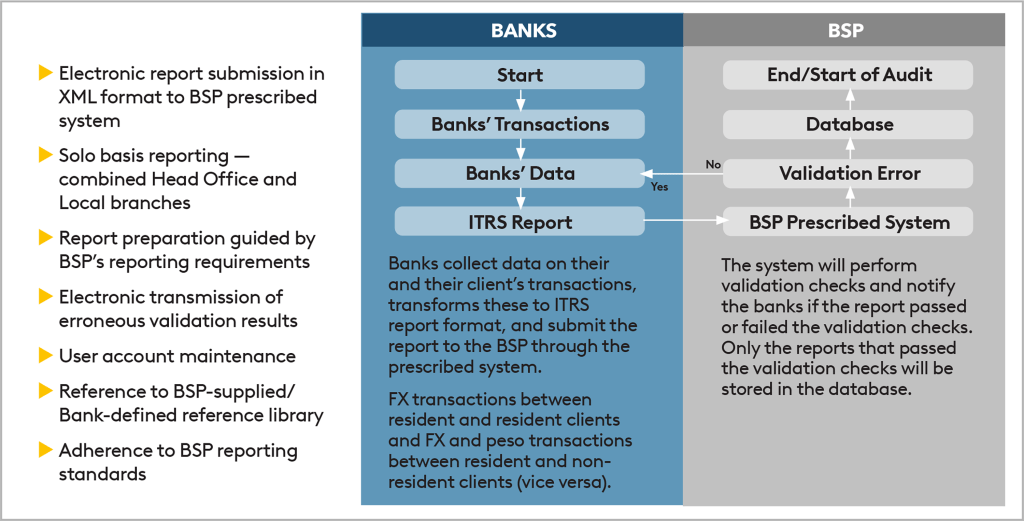BSP to deploy an International Transaction Reporting System (ITRS)
Central Bank initiative for prudential supervision and monitoring of all FX transactions for regulated banks in the Philippines.
The Bangko Sentral ng Pilipinas (BSP) is in the process of transforming all data collection in XML and API formats as the first step to enhancing its compliance ecosystem by rationalizing the data, enabling faster data collection and more integrated data quality. In keeping with this transformation, BSP has announced that it will launch its International Transactions Reporting System (ITRS) in April 2024, after a soft launch in January, to capture and monitor all cross-border transactions.
The ITRS is a data collection system that acquires information from all regulated banks under BSP, down to the level of individual transactions. While primarily intended for gathering data on peso and foreign-currency transactions between the country’s residents and non-residents, as well as inter-resident foreign currency transactions via the domestic banking system, the ITRS also includes a summary report. This report records data on banks’ daily net on-balance sheet foreign-exchange (FX) assets (liabilities) and net foreign asset position.
Purpose of this new system
The ITRS serves the following purposes:
- To monitor cross-border transactions and collect data for compiling the country’s Balance of Payments (BOP) statistics based on international standards.
- To serve as a platform for the BSP’s prudential supervision and monitoring of foreign exchange transactions.
ITRS Reporting Process

List of reports to be submitted
| Main Report | Consolidated Peso and Foreign Exchange (FX) Assets and Liabilities | Weekly |
| Schedule 1 | Interbank Transactions | Weekly |
| Schedule 2 | Export of Goods | Weekly |
| Schedule 3 | Import Letters Of Credit (Lcs) Opened and DA-OA Import Availments and Extensions | Weekly |
| Schedule 4 | Import of Goods | Weekly |
| Schedule 5 | Services | Weekly |
| Schedule 6 | Personal Remittances | Weekly |
| Schedule 7 | Investment Income and Other Primary Income | Weekly |
| Schedule 8 | Secondary Income and Capital Account | Weekly |
| Schedule 9 | Direct Investments | Weekly |
| Schedule 10 | Portfolio Investments | Weekly |
| Schedule 11 | Spot, Financial Derivatives and Employee Stock Options | Weekly |
| Schedule 12 | Foreign Exchange Market Turnover | Weekly |
| Schedule 13 | Loans | Weekly |
| Schedule 13.1 | Consolidated Report on Foreign Currency Loans Granted by Banks to Non-Residents | Monthly |
| Schedule 14 | Other Foreign Investments (Other Than Loans) | Weekly |
| Schedule 15 | Transactions with Resident Non-Banks | Weekly |
| Schedule 15.1 | Consolidated Report on Foreign Currency Loans Granted by Banks to Resident Non-Banks | Monthly |
Cross-reference with BSP FRP Reports
The mandatory BSP ITRS Reconciliation Report involves a comparison between the ITRS Main Report and the Financial Reporting Package (FRP). This report encompasses validations and variances across a total of 145 line items:
- 69 line items for On-Balance Sheet FX Assets
- 76 line items for On-Balance Sheet FX Liabilities
Furthermore, the line items will display the ITRS account codes, which are cross-referenced with the FRP account codes.
The variances between ITRS and FRP are distributed across four books:
- Foreign Regular Book
- FCDU / EFCDU Book
- Foreign Office Book
- Peso Accounts Book
This report is generated on a monthly basis, specifically on the last working day of the month following the reference month.
Synergies between BSP reporting and ITRS reporting

Timeline
- On or before October 2nd, 2023: BSP will provide banks with the XML schema and related documentation
- October 2023: BSP will conduct technical briefings for banks
- November – December 2023: Banks will conduct pilot testing
- January 2024: ITRS soft launch
- April 2024: Full implementation of ITRS
BSP's forthcoming International Transaction Reporting System will be key in supporting the integrity of the Philippines’ financial ecosystem, fostering trust among market participants, and aiding in the prevention of financial misconduct.
Challenges posed by this regulation
Taking a comprehensive approach to tackle these requirements provides financial institutions with the chance to implement the necessary tools effectively. Such an approach needs to consider a platform that offers the following benefits:
- Quick Time to Market:
– Quick and easy implementation with key components available out-of-the-box, including templates, validation rules, and comparative reports.
– Configuration through visual business rules for simplicity.
- Data Dictionary with Data Validations:
– Provides an out-of-the-box Data Model with data validation against regulatory-approved values and ITRS reference libraries.
– The solution is capable of ingesting data in its existing state from various source systems and formats.
- Fully-Managed SaaS:
– Banks should have the flexibility to choose cloud deployment for the solution.
- Reconciliation between FRP and ITRS:
– Offers a side-by-side comparison and automated mapping of account codes between the Financial Reporting Package (FRP) and ITRS reporting.
- Conformance to ITRS and FRP Codes:
– Allows users to view report allocation and reconciliation for each record at a granular data level.
– Offers the ability to slice, dice, and visualize the data.
- Workflow, Attestation, and Submissions:
– Implements operational processes for review and validation prior to submission, ensuring accuracy and completeness.
– Maintains all intermediary and final data and rules to support audit defense.
– Provides internal reports to ensure submission readiness.
The potential benefits of the new International Transactions Reporting System introduce a unique opportunity for financial institutions to transform challenges into avenues for growth and excellence in the dynamic landscape of financial oversight and compliance.
As BSP initiates its second-largest transformation program, banks must not only address immediate FRP and ITRS requirements, but also adopt platforms that enable scalability to accommodate future BSP changes and cross-referencing demands across diverse data sets. This strategic approach paves the way for a harmonized financial ecosystem that promotes compliance, trust, and resilience.
